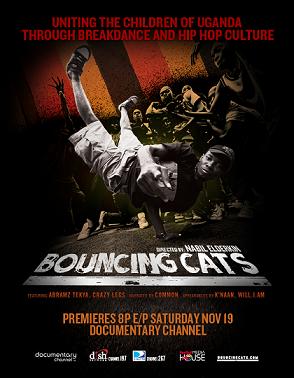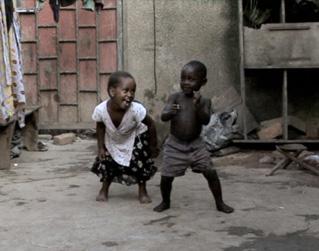Hip-Hop Healing in Uganda
Documentary Bouncing Cats Shows How Breakdancing Is Rejuvenating Life in Africa

In 2006, when I spent nearly one month in the East African country of Uganda covering the presidential elections and reporting on the unending war in the north between the country’s army and crazed rebels, there wasn’t much hope to go around. The system seemed corrupt from the top down, you could almost hear international bureaucrats sucking the cents out of every nonprofit dollar donated to the country, and, with apparently rigged elections, there did not seem to be a lot of good news on the horizon. This was especially true in Northern Uganda, where most of the population lived in refugee camps due to attacks by the Lord’s Resistance Army, those crazed rebels who had become notorious for stealing children to turn them into soldiers or sex slaves.

But there were occasional flickers of joy and optimism, most poignantly during my overnight visit to the Pader Town Council, a headquarters of sorts for the various NGOs (nongovernmental organizations) working in Northern Uganda and the site of a refugee camp that was home to thousands of mostly destitute Ugandans. While walking through that camp one afternoon, I stumbled upon an impromptu jam session, where homemade instruments made from discarded World Food Programme and U.S. AID containers were being played with tremendous skill. People were singing songs that sounded like redemption, and the dancing was exuberant. My body became filled with chills, and I still listen to the sounds I recorded during that experience to this day, five years later. In a land of despair, this was a magical scene, and it was easy to sense the transformative powers that music offers, even in such down-and-out situations.
That’s the very same spirit at the heart of the new documentary Bouncing Cats, which explores how America’s hip-hop culture is being exported to Uganda and providing a positive outlet for the youth, both in the capital of Kampala and in Gulu, one of the main cities in Northern Uganda. Directed by Australian filmmaker/photographer Nabil Elderkin, narrated by the rapper Common (who was at UCSB this week, incidentally), and featuring interviews with social justice-oriented hip-hop stars Will.I.Am and K’Naan, the doc shines a bright light on Breakdance Project Uganda, which was founded by a local man named Abramz. He invites the American breakdancer Crazy Legs from the famous Rock Steady Crew to come for a visit, and the film follows that New York City-ite’s life-changing and often touching experiences throughout the country.
Music and dance have long played a role in Ugandan life, but what this film makes clear is that most of the older styles are based on tribal traditions, which inherently focus on ethnic differences rather than serving as a unifying force. Breakdancing, however, is an import, so all Ugandans, regardless of tribe, can coalesce around the form and learn to live together a little bit better. Beyond that central message, the film shows off some of Uganda’s beautiful nature, features some seriously ridiculous dancing, and gives great insight on how hip-hop has been a force for positive change in the United States, Uganda, and beyond.
After two years on the film festival circuit, Bouncing Cats — whose title refers to the little song that Ugandan breakdancers sing to make a beat when there’s no stereo around — premieres to the general cable-watching public tonight, November 19, on the Documentary Channel at 8 p.m. It screens again on November 25 at 3 p.m., December 29 at 11:30 p.m., January 26 at 6:30 p.m., and January 27 at 9:30 p.m.
For more information, see bouncingcats.com.



